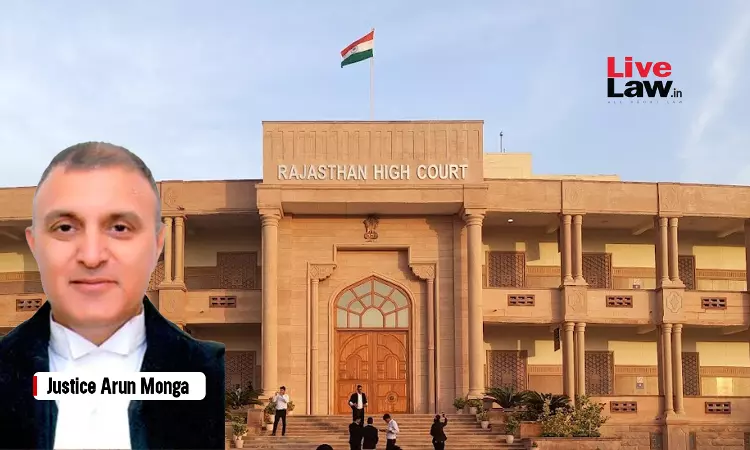- Home
- /
- High Courts
- /
- Rajasthan High Court
- /
- Rajasthan High Court Orders State...
Rajasthan High Court Orders State To Regularize Eligible Employees Appointed As Far Back As In 1979, Give Benefits To Irregular Appointees
Nupur Agrawal
3 May 2025 9:00 AM IST
Observing that in a welfare State prolonged denial of regularization despite continuous service for decades borders on institutional exploitation, the Rajasthan High Court passed a slew of directions to the State government in respect of various employees appointed as far back as 1979 whose initial appointments were irregular or illegal, but who had completed long years of service.Justice...
Observing that in a welfare State prolonged denial of regularization despite continuous service for decades borders on institutional exploitation, the Rajasthan High Court passed a slew of directions to the State government in respect of various employees appointed as far back as 1979 whose initial appointments were irregular or illegal, but who had completed long years of service.
Justice Arun Monga held that constitutional morality warranted that appointments irregular in form but not in substance, backed by sanctioned posts and years of continuous service, should not remain at the mercy of procedural regularity.
The Court was hearing a bunch of petitions by petitioners–Class III and Class IV employees–who were appointed on various posts, some of them, as early as in 1979, and were continuing in service till then. However, till date, their services were not regularized.
In a Supreme Court case of Secretary, State of Karnataka & Ors. v Uma Devi (2006) the constitutional bench had directed that the State shall take steps within 6 months from the date of the order to regularize, as a one time measure, the employees who were appointed irregularly and had worked for ten years or more, and were eligible in terms of the criterion laid down.
As opposed to the timeline of 6 months in the order, the State of Rajasthan took the steps towards such regularization only in 2009, yet the cut-off date for counting the required length of 10 years was fixed retrospectively to 2006.
The contention was that there were significant number of irregularly appointed persons who completed 10 years' service between 2006 and 2009, and who could have been eligible for regularization if the cut-off date for such calculation was postponed from 2006 to 2009 when the notification was actually issued.
The Court held that, “The delay in notifying the Rules, ibid, upto 08.7.2009 was wholly on the part of the State Government. Yet, the cut off date for counting the required length of 10 years of service was fixed therein retrospectively from 10.04.2006…For the default and delay wholly on the part of the respondent State, such persons would be excluded from consideration for regularization and made to suffer.”
After perusing the entire judicial trajectory of evolution of the concept of right to regularization by sheer longevity of service rendered by those who were hired through back door, the Court gave the following order, directing it to be implemented in rem.
1. Regularization of Eligible Petitioners
State shall regularize all petitioners whose initial appointments were irregular but not illegal, and who had completed ten years of service on or before 2009 with all consequential service benefits.
2. Vacancies and future appointments
For necessary sanctioned vacancies, the State shall initiate administrative processes to fill these through regular recruitments, and shall allow petitioners and similarly situated persons whose initial appointments were either irregular or illegal to:
a) Compete in open selection;
b) Waive the age restrictions;
c) Award weightage for past service as per Rule 20(2) of the Rajasthan Contractual Hiring of Civil Posts Rules, 2022.
3. Petitioners with less than 10 years of service
All petitioners and similarly situated persons whose initial appointments were irregular but not illegal, and who had not completed 10 years shall be accorded benefits of service weightage and age relaxation on parity with those whose appointments were illegal but eligible under the case of Uma Devi.
4. Petitioners with Illegal Appointments
For Petitioners/other employees whose initial appointments were illegal, the State shall,
a) Allow them to participate in regular recruitment processes;
b) Grant age relaxation and experience based weightage as per Rule 20(2) of the Rajasthan Contractual Hiring of Civil Posts Rules, 2022.
c) Issue individual speaking orders communicating their status and eligibility.
5. Constitution of Monitoring Committee
Chief Secretary shall constitute a monitoring committee to oversee compliance of this judgments and submit quarterly status report.
6. Transparency and Accountability
The State shall publish the compliance report and list of regularized employees on its official website.
Accordingly, the petitions were disposed of.
Title: Giriraj Prasad Sharma v State of Rajasthan, and other connected matters
Citation: 2025 LiveLaw (Raj) 164



